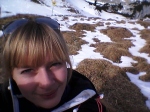Institute for Biodiversity & Ecosystem Dynamics (20/08/2015)
Day 4 at Science Park 904 for the XPERT summer school and time to think about space as well as time! Sara Varela started us off thinking about how to define “macroecology” and the potential for macropalaeoecology! As in all aspects of ecology it is a question of scale and resolution… Once the conceptual side had been addressed Sara stepped us through the implementation of R scripts to extract data from the Palaeobiology and Neotoma database. The ability to extract, plot and analyse selective data from Neotoma (individual and multiple records) struck me as a particularly powerful tool; and one that will only get more powerful as more data is uploaded!
In the afternoon Rob Colwell presented some new ways of modelling speciation through the Quaternary in South America, and gave a practical introduction to the SAM software; students had the opportunity to explore biogeographic data from GBIF and contemplate the nature and problem of autocorrelation.
In the evening around 40 XPERT participants, interested scientists and members of the general public were treated to two talks focused on ecology, biodiversity and past environmental change.
 The first by Tessa Driessen, entitled: Vegetation shifts, fire and human activity, presented new palaeoenvironmental data from Samoa. Combining new pollen (vegetation) and charcoal (fire) data with the current knowledge on past regional climate and human activity (archaeological record) Tessa was able to assess the relative impact of humans and climate on vegetation change on Samoa during the last 9200 years. Tessa’s work forms part of a larger project exploring past environmental change on Samoa lead by David Sear (University of Southampton), and her presentation was given as part of the requirements for the completion a MSc in Environmental Biology at Utrecht University.
The first by Tessa Driessen, entitled: Vegetation shifts, fire and human activity, presented new palaeoenvironmental data from Samoa. Combining new pollen (vegetation) and charcoal (fire) data with the current knowledge on past regional climate and human activity (archaeological record) Tessa was able to assess the relative impact of humans and climate on vegetation change on Samoa during the last 9200 years. Tessa’s work forms part of a larger project exploring past environmental change on Samoa lead by David Sear (University of Southampton), and her presentation was given as part of the requirements for the completion a MSc in Environmental Biology at Utrecht University. The second by Fernando Rodriguez, entitled: Biodiversity in Ecuador, provided a comprehensive overview of the biodiversity of Ecuador and introduced to many the new Instituto Nacional de Biodiversidad in Ecuador. The Instituto Nacional de Biodiversidad, which Fernando is Director of, was inaugurated by Presidential Decree in 2014 and is part of the Ministry of Environment. Fernando’s vision for the institute is that it will become the centre for biodiversity knowledge and research in Ecuador. This amazing initiative has an extensive remit to collate both scientific and cultural knowledge about biodiversity with a view to protecting and valuing it as a resource. Fernando concluded his talk by presenting data from his own PhD project working on the past environmental history of Podocarpus National Park in Ecuador.
The second by Fernando Rodriguez, entitled: Biodiversity in Ecuador, provided a comprehensive overview of the biodiversity of Ecuador and introduced to many the new Instituto Nacional de Biodiversidad in Ecuador. The Instituto Nacional de Biodiversidad, which Fernando is Director of, was inaugurated by Presidential Decree in 2014 and is part of the Ministry of Environment. Fernando’s vision for the institute is that it will become the centre for biodiversity knowledge and research in Ecuador. This amazing initiative has an extensive remit to collate both scientific and cultural knowledge about biodiversity with a view to protecting and valuing it as a resource. Fernando concluded his talk by presenting data from his own PhD project working on the past environmental history of Podocarpus National Park in Ecuador.
